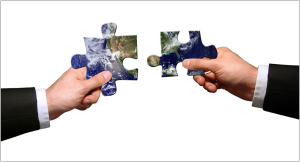30 May 2014
Environment, economy and equity: Pillars for sustainability

What is sustainability?
What does sustainable, or sustainability, mean? Well, it depends on how it’s used and who you ask. It is most often defined by a quote from "Our Common Future," also known as the Brundtland Report, in 1987:
“Sustainable development is development that meets the needs of the present without compromising the ability of future generations to meet their own needs.”
—Operational Strategic Initiatives Team, UC San Diego
To better understand why sustainability has become such an important ideology in today’s world, we turned to Kristin Kielich, who is part of the newly formed team for Operational Strategic Initiatives at UC San Diego. In addition to her campus role, Kielich sits on UC San Diego Extension’s Sustainable Business Practices Advisory Council and teaches at Extension.

Kristin Kielich, Operational Strategic Initiatives Team at UC San Diego and Extension Instructor
“Sustainability is about cleaning our air, cleaning our water, maintaining healthy food sources and supporting our communities while preserving financial resources,” Kielich said. “It is about providing a better future for upcoming generations.”
Kielich’s passion for the environment is long-lived. She entered California Polytechnic State University, San Luis Obispo, to study environmental law. Kielich soon fell in love with the concept of sustainable business management and the need for business owners and leaders to understand the importance of protecting the earth’s resources. After graduating with a B.A., she headed to San Diego and Point Loma Nazarene University, where she got her MBA.
“I wanted to talk about sustainability in terms business leaders could understand,” she said. “How sustainability could be good for the environment and their bottom line.”
Integral to helping businesses and individuals understand sustainability are, according to Kiehlich, the Three Pillars of Sustainability…environment, economy and equity.
Three Pillars of Sustainability
Environment: This pillar looks to ensure the planet is protected from the lack of foresight of corporations and neglect. It refers to the conservation of natural resources and the reduction of impacts on eco-systems.
It includes the protection of the natural environment, the development of eco-friendly products, conserving resources, ensuring air quality and water quality, reducing pollutants and reducing waste.
“We need to ensure we have a sufficient amount of natural resources to provide the planet’s seven billion people,” Kielich said.
 Economy: The second pillar is associated with cost. A business can only be sustainable if it makes sense economically. The business must be able to use and allocate resources efficiently over time.
Economy: The second pillar is associated with cost. A business can only be sustainable if it makes sense economically. The business must be able to use and allocate resources efficiently over time.
“A truly sustainable business should not come at the expense of society nor the company’s value generation,” said Kielich.
Equity: The third pillar references the ethical responsibility businesses have to mankind. Sustainable businesses need to look beyond profit to such social issues as injustice, poverty and inequality. Equity takes into consideration such issues as peace, social justice, reducing poverty, and living wages.
“We need people in all industries being sustainability champions,” she said.
UC San Diego Extension: Sustainable Business Practices Professional Certificate
Kielich sees sustainability education as paramount in today’s society. She believes the Sustainable Business Practices Professional Certificate gives students an incredible overview of environmental sustainability and a framework to incorporate sustainable business practices into their business models.
“Real world experience is being shared among students and instructors,” she said. “Students can bring sustainability challenges they are facing at their workplaces and get help in solving them.”
Kiehlich doesn’t miss a law degree. She may not be fighting for the environment in a court of law, but she’s where she wants to be — building a case for sustainability one business at a time.
“Through sustainability we are planting seeds now, to get to the growth down the road,” she said.